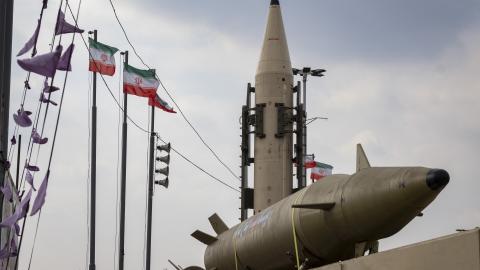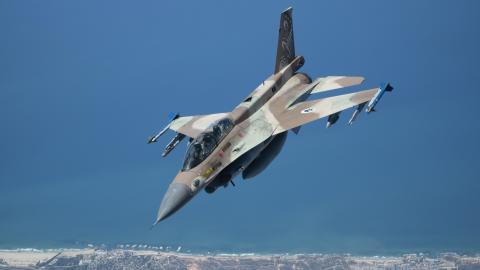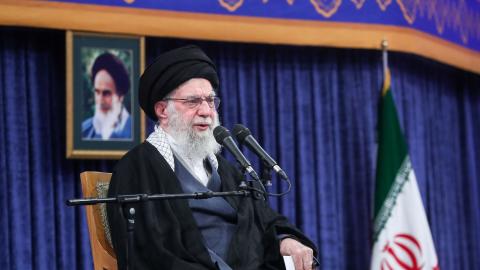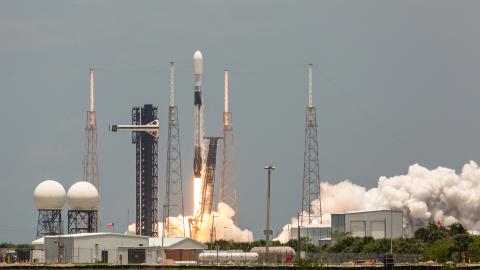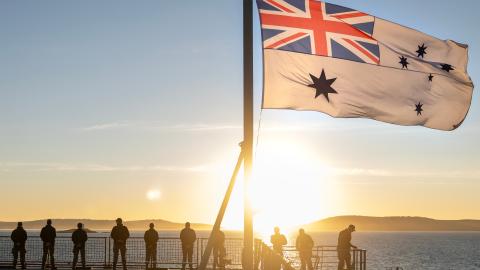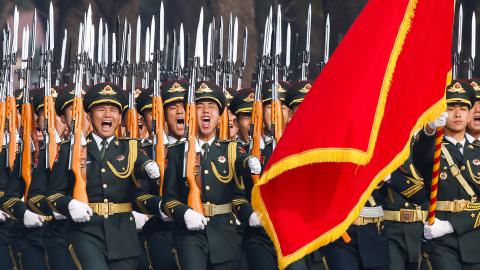In his speech today at American University on the Iran nuclear arms deal, President Obama asked for critics to evaluate the Joint Comprehensive Plan of Action on its own merits. “Unfortunately,” said Obama, “we're living through a time in American politics where every foreign policy decision is viewed through a partisan prison, evaluated by headline-grabbing sound bites, and so before the ink was even dry on this deal, before Congress even read it, a majority of Republicans declared their virulent opposition. Lobbyists and pundits were suddenly transformed into armchair nuclear scientists.”
In other words, while Obama called for bipartisanship he tarred those skeptical of the deal as partisan hacks who don’t know what they’re talking about and are influenced by foreign governments—Israel’s, to be precise, which, according to Obama, is the only entity in the world that does not support the JCPOA.
The reality however is that the U.S. public doesn’t like the agreement. A recent poll from Quinnipiac University and another from CBS News show the same thing—American voters oppose the deal by a margin of 2 to 1. Sure, they’re not all nuclear experts like energy secretary Ernest Moniz, but you don’t have to get too far into the weeds to know that it’s a bad agreement. In fact, all you really need to do is pay attention to the news coming out of Iran to know that this deal is worthless.
At Commentary, Michael Rubin shows Iran is very clear that it won’t allow inspectors into the nuclear facilities that really matter—the military sites. “The latest to speak up is Ali Akbar Velayati,” writes Rubin,
a former foreign minister who was promoted upwards to the Office of the Supreme Leader. Yesterday, he declared, “The arrival of any foreigner, including inspectors of the IAEA or any other inspector, to our sensitive military sites is forbidden in any situation.” That position — straight from the Supreme Leader’s office — seems to make moot the compromise at which the IAEA and Iran supposed arrived to enable managed inspections so long as no Americans were on the inspection teams.
A Bloomberg View report explains that the Iranians are already sanitizing other sites in the event of an IAEA inspection: “The U.S. intelligence community has informed Congress of evidence that Iran was sanitizing its suspected nuclear military site at Parchin.”
The Iranians are also very clear that, unlike the White House, they themselves make no distinctions between hardliners and so-called moderates. We are all one united nation with a single leader and we all obey this leader irrespective of our tastes and tendencies," "said the leader of the Basij Forces, Commander Brigadier General Mohammad Reza Naqdi.
John Kerry told Jeffrey Goldberg that the deal will empower moderates like his Iranian counterpart Javad Zarif, but in Vienna last month Zarif lectured Kerry and the other P5+1 representatives on the virtues of IRGC-Quds Force commander Qassem Suleimani. "Do you know who you are talking about?” said Zarif.
Do you know that the Iranian nation appreciates them for their bravery and sacrifices in defending their homeland against Saddam's aggression? When aggressive Saddam had all types of weapons in his hand and your governments had closed all paths to Iran's access to arms supplies, the young IRGC forces defended our country with their blood and sacrifices. Our people are thankful to them… You'd better stop showing to the Iranian nation that you are standing opposed to the IRGC.
Kerry might not mind being threatened by the representatives of a criminal regime that targeted American soldiers in Iraq and Afghanistan, but the American public won’t stand for it. They think it’s a bad deal because they don’t trust Iran to keep its end of the bargain. They don’t want war any more than the president we elected, but we also don’t want our commander-in-chief to be acting like Iran’s lawyer and relaying threats on behalf of the clerical regime.
The point that Obama was at pains to drive home this morning was that it’s either this deal or another Middle East war. But as one of Israel’s former national security advisors Yaakov Amidror argues, “this agreement will likely and necessarily lead to the use of force against Iran, at some stage or other, in order to halt its race toward nuclear weapons. This, however, will take place in far worse conditions than before the agreement, against a far stronger Iran.”
It seems that the American voter think a little more highly of Obama and Kerry than they do of themselves. The president and his top diplomat keep saying they can’t do any better than the JCPOA, but Americans, by a margin of 2 to 1, are saying do better. What they’re saying is, stop calling us disloyal, stop threatening us with war, and go get us a real agreement that ensures our peace, an American peace.


